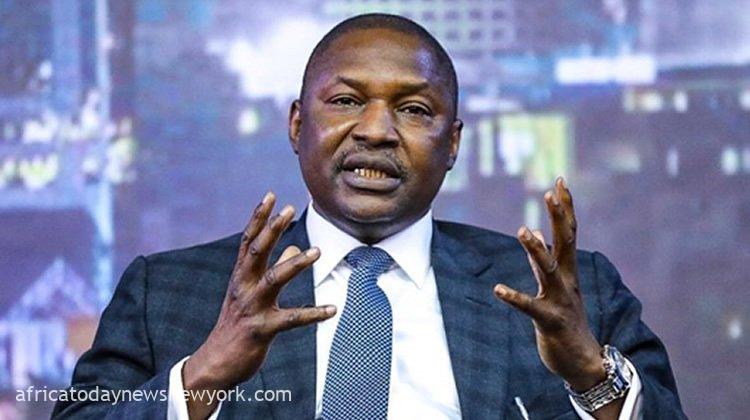The Attorney General of the Federation and Minister of Justice, Abubakar Malami (SAN), was on Thursday grilled by the House of Representatives for the second time over the alleged illegal sale of 48 million barrels of crude oil in China valued at over $2.4bn.
Malami, who was accompanied by the Permanent Secretary, Ministry of Justice/Solicitor-General of the Federation, Beatrice Jedy-Agba, finally appeared before the House’ Ad Hoc Committee to Investigate Alleged Loss of Over $2.4 Billion in Revenue from Illegal Sale of 48 Million Barrels of Crude Oil Export in 2015 Including All Crude Oil Exports and Sales by Nigeria from 2014 To Date.
Africa Today News, New York gathered that despite the documents presented to the committee based on an earlier request by the panel, the lawmakers asked for more documents.
While Malami restated his earlier position about the allegation and the probe, he also asked the lawmakers to avail him documents and facts at their disposal to assist him in the investigation.
The chairman of the committee, Mark Gbillah, earlier noted that the lawmakers were in possession of communication from the outgoing President Muhammadu Buhari ‘regarding this particular issue, which we will not say openly but will take up with you in private because we also understand certain things are classified and confidential.’
Gbillah added, ‘We are not just embarking on something that is a wild goose chase. I want to put that on the record.’
Read Also: $2.4bn Oil Probe: Malami Appears Before Reps Committee
The chairman, while faulting an earlier claim by Malami at the last meeting that there was no formal committee set up by the President to investigate the matter, insisted that ‘an actual committee was set up, maybe you (the minister) are privy to it or not.’
He added that a former Minister of State for Petroleum Resources also made a formal communication to the National Security Adviser, Maj. Gen. Babagana Monguno (retd.), “over this issue and we are in possession of that document.”
Gbillah stressed, ‘So, I am quite surprised that your esteemed office did not have all these information. It might not be within your purview of knowledge, but we are surprised that it is not.”
In his response, Malami insisted that he was not part of any formal presidential committee.
He added, ‘Secondly, aside from not being a member of any such committee, if any had existed, no document was made available to me as a person or to my office relating to this (petroleum) product. I am talking about a document made available by a whistle-blower or a document made available by the system. And to further confirm the problem, even when I was invited by this committee to appear, not a single document was made available to me for consideration.”
The minister said, rather, the committee in its correspondence to the ministry asked “about 30” questions and he had responded to them.
Malami stated, ‘So, in the absence of facts, in the absence of documents being presented for my consideration by the National Assembly, in the absence of documents being presented to me by the Executive for consideration, in the absence of my participation in any committee relating to the subject matter of investigation, it is not out of place for me to conclude that there is no justifiable, reasonable grounds and basis for such consideration. And I stand my ground.’
The AGF noted that the “starting point” was that since the document had documents at its disposal that are “establishing otherwise,” they should be forwarded to his office for consideration and then “perhaps revert to you with a comprehensive position in line with the analysis of the documents.”
Malami urged the committee and the ministry to “collectively review” the documents and reach a conclusion on them. Gbillah, however, disagreed, stating that only the panel could determine how it would conduct the probe.
While the committee resolved to forward relevant documents to the minister by Tuesday, he noted that he would be dealing with the lawmakers by then as a “private citizen.”

